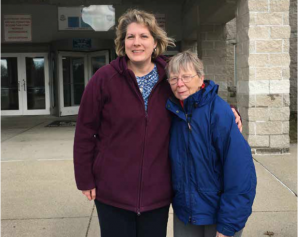
Photo courtesy of Trish Spofford.
For over twenty years, UConn Extension has partnered with the Department of Corrections to offer the UConn People Empowering People Program at Correctional Institutions (UConn PEPCI). UConn PEPCI is a personal and family leadership program modeled after the community UConn People Empowering People (UConn PEP) program and focuses on keeping people from returning to prison.
The program encourages inmates to be self-reflective and to draw on their unique strengths, life experiences, and capacities. UConn PEPCI volunteers create conditions for offenders to develop the willingness and ability to take responsibility for their lives and become empowered.
The UConn PEPCI program creates a sense of community when teaching the curriculum so that inmates can support and encourage one another. By enhancing inmates self-worth the hope is that they become more self-sufficient and independent; they can reflect on their lives and make better decisions in the future; and they can explore different options and develop more positive ways of thinking and behaving. Lesson topics include: values, community and self esteem, learning to feel good about myself, understanding my personality, communicating so people understand me, listening and relating well to others, problem solving and managing conflicts, coping strategies, choosing and enjoying healthy connections, family relations, parenting from prison, goal setting and skills for returning home. Every session begins with the UConn PEP Pledge.
The feedback from inmates about the UConn PEPCI program is consistently positive and shows how grateful they are for what they learn. Comments always include a thank you to the volunteers and fellow inmates for their time and for creating a safe environment where they can share. One inmate summarized what many said in their comments, “Choices and decisions affect my tomorrow so I must be patient and stay in control. I must build within me the power to make the right decisions, set goals and achieve them for my own mental health and self-empowerment. I have to believe that I matter, and I have to be better than the hand I was dealt.” Another inmate said, “This program gives me a starting point to build empowerment within myself from the bottom up. I have to believe in myself or no one else will.”
The Department of Corrections supports programs like UConn PEPCI because correctional institutions providing programming and support for rehabilitation lowers recidivism rates. Connecticut dropped its inmate population in recent years, but the United States continues to have the largest known incarcerated population in the world at about 1.5 million people at the end of 2017. At least five million children – about seven percent of American youth – have had an incarcerated parent, with African American, low-income, and rural minors disproportionately affected.
Currently, UConn PEPCI is offered in four correctional institutions. Volunteers who teach the UConn PEPCI program are exemplary. In the past year four UConn PEPCI volunteers received Department of Corrections awards for their outstanding contributions. Trish Spofford, Coordinator for the UConn PEP CI program is working to recruit new volunteers, expand the program to other facilities and offer additional programming for UConn PEP CI graduates.